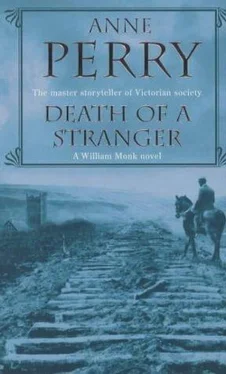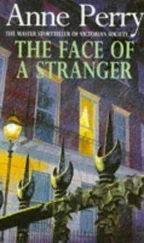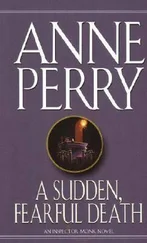He urged his horse forward and went carefully down the incline, following what track there was, until he was on the level and only a hundred yards from the rail. Now the noise was all around him, the thud of pick heads hitting rock and earth, the rattle of wheels on the wooden runs up the cutting, the ring of hammers on steel, voices.
The nearest man to him looked up, his shovel idle in his hands for a moment, his back straightening slowly. His skin was caked with dust and the sweat cut rivulets through it. He regarded Monk’s casual clothes and well-cut boots, and the horse standing at his shoulder. “Yer one o’ the surveyor’s men?” he asked. “ ’E in’t ’ere yet. Yer a day soon.” He half turned. “Eh, ’Edge’og!” he shouted at a short, heavy-shouldered man with a shock of gingery hair. “Yer sure yer in the right place, then?”
There was a guffaw of laughter from half a dozen men further away, and they all resumed their digging and shoveling.
Hedgehog screwed up his face. “No, Con, we’d better start all over an’ dig through that damn great ’ill over there!” he replied.
“Three weeks, mebbe,” Con said to Monk. “If that’s wot yer want ter know. I in’t see’d yer ’ere before. Yer come up from Lunnon?”
Apparently they assumed he was from Baltimore and Sons’ main office.
“Where’s your foreman?” Monk enquired.
“I’m the foreman, Contrairy York,” the first man replied. “Like I said, three weeks. Can’t do it no faster.”
“I can see that.” Monk squinted along the line of the rail. The last bit of the viaduct would take another two weeks at least, and then there were sleepers to lay, the rails themselves to lay and tie. It was double track most of the way, single through the cutting and as far as the other end of the viaduct. There must be a plan for timetables and trains passing. A length like this was far too expensive to use only one engine at a time on.
He had studied the survey map. The shortest route lay through the hill he had just crossed. “Couldn’t you have cut through that?” he asked. “Then you would have avoided having to build a viaduct.”
“ ’Course, we could,” Contrairy said dismissively. “Cost, though! Too ’igh fer a straight cuttin’, an’ tunnels are about the most expensive things there is. Look at yer map. See the ’eight on it! An’ granite! Takes time, an’ all.”
Monk swung around and looked up at the hill. He pulled out the map from his pocket and read the height on it, then looked at the crest of the rise again. Something flashed in his memory and was gone before he caught it, but it was a moment of unease, nothing more, nothing he could explain. He should check the alternative routes, see who owned which land, where the vested interests lay, estimate the costs of cutting and tunneling the hill for a direct route compared with the small cutting there was here, and the viaduct, and the extra land, and length of rail. It would be a long, tedious task, but the answer, if there was one, lay in the figures. He had had the skill once. It had been where his business lay… his and Dundas’s. That was a chill thought he would rather not have owned, but it would not go away.
He thanked the navvy, mounted his horse again and rode slowly back up the slope, thinking. He had studied the surveyor’s maps and reports, and Baltimore and Sons’ estimate of costs for rerouting. On paper it seemed reasonable. The investors had accepted it. Some of the new land necessary was expensive, but the land for the old route had been expensive also. It was the hidden costs that would make the difference: the bribes to do one thing or another, what to purchase, what to avoid. That could be where the fraud lay.
It was warm here, even with the very slight breeze ruffling the grass. A rabbit popped up, gazed around, then bolted twenty yards, its white tail flashing until it disappeared down a hole.
It was a moment before it meant anything to him. He searched his memory. It was the rabbit. It signified something. He was on another hillside in the sun, but colder, a wind out of the east, clouds scudding across the sky and a sense of darkness in spite of the bright light.
He remembered he had watched a rabbit sit in the sun, nose twitching, then take fright and run, going into a hole. He had seen it with a slow-dawning horror!
Why? What could be more ordinary than a rabbit in the grass, running away and diving down one of its own holes into a vast warren riddling a hillside? Doubtless it would emerge somewhere else, a hundred yards away.
Except that if a rabbit could dig through the hillside and build tunnels using nothing but its feet, then an army of navvies with explosives would have little trouble digging a tunnel for a train. The hill could not possibly be granite! The survey had lied!
He could remember it now, the shock of realization, the gaslight wavering on the paper as he opened it out on the table in his hotel bedroom and read the legend on the map. But he could not recall what else there had been, try as he might, sitting there now with the sun and wind on his face, and his eyes closed, attempting to re-create the past.
Of course there was profit in some land and not in other. But surely the investors had also checked? They must have representatives who were aware of that. It would have to have been cleverer, far subtler than simply a lie, whether the land were granite instead of clay, or chalk or conglomerate, or whatever the hill was actually composed of.
And always in the back of his mind there was the jumbled horror of something dark, unclear and violent, the rending of steel, the scream of tearing metal, sparks in the night, then flame, and through it all fear so dreadful it cramped the stomach and locked the muscles in pain.
But there seemed nothing to connect the two. Arrol Dundas had been convicted of fraud, guilty or not. There had been a crash which Monk seemed to remember, and shortly after Dundas’s death he had left merchant banking and gone into the police force, driven by the passion to serve justice in future, which had to mean he had believed with a passion that there had been injustice then.
But he could do nothing more here to help Katrina Harcus or learn any greater truth about Michael Dalgarno. If there were fraud at Baltimore and Sons, then Dalgarno was almost certainly involved in it, but it was merely profiting unjustly from land purchase. There was nothing to cause injury to anyone, except the loss of possible profit to the investors. That was yet to be proved, and speculation was always as likely to end in loss as in gain. He could call for an official audit if any evidence warranted it.
It was time he stopped evading the old truth that lay at the core of his fear. Remembered pieces were little help. He must use the detective skills he had refined so well. If he wanted to know it for a client, where would he begin were it himself and not Dalgarno that he were investigating for Katrina Harcus?
Begin with the known, facts that could be checked and proven without the possibility of misinterpretation. He knew the date on the work order with his own name on it that Katrina had handed to him with the others. That was proof that he had once worked for Baltimore and Sons, but not where, and not that he had had anything to do with the fraud for which Dundas had been convicted.
Could there be more than one fraud? No, too much of a coincidence.
Nonsense-lies to comfort! Of course there could. A man who will defraud once will adopt it as a pattern if he gets away with it. The question then became: was Dundas caught on his first attempt, or on the second or third, or the twentieth?
With a jolt so sharp he startled his horse by the sudden change in his hands on the reins, Monk realized he had actually admitted the possibility that Dundas had been guilty. In fact, he had assumed it. What a betrayal of the belief he had held without shadow all his life, until now!
Читать дальше












